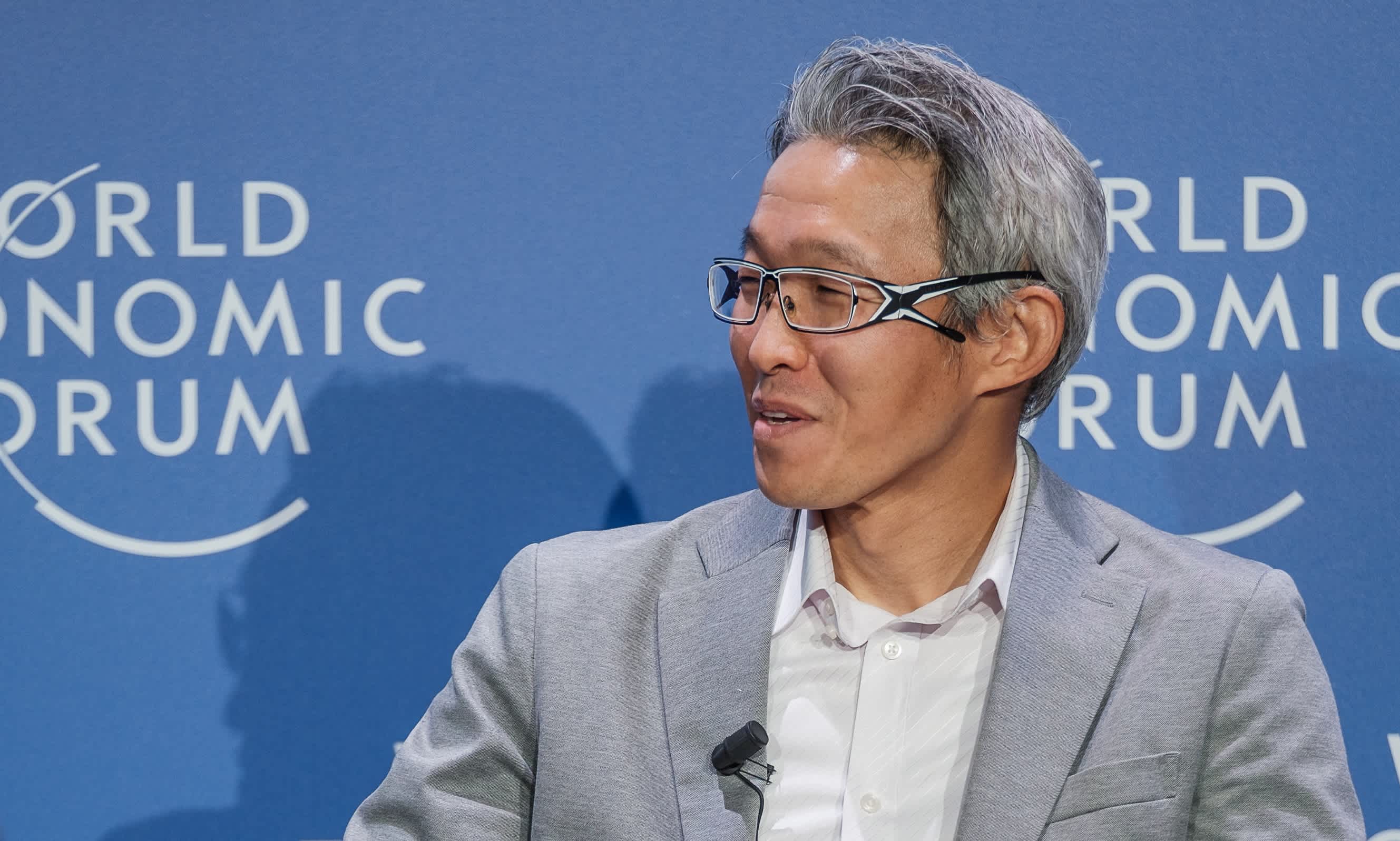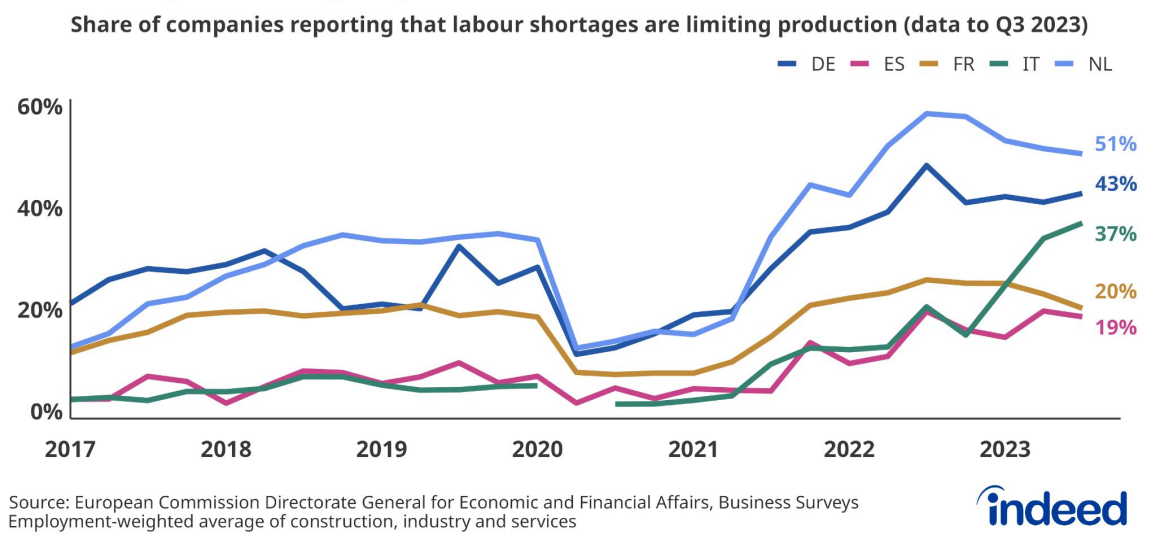This month, world leaders and business executives gathered for the World Economic Forum (WEF) Annual Meeting 2024 in Davos, Switzerland. Hisayuki “Deko” Idekoba, President and CEO, Recruit Holdings, and Rony Kahan, Director, Recruit Holdings and Chairman & Co-Founder, Indeed, and Svenja Gudell, Chief Economist, Indeed – engaged with WEF delegates, media and other attendees on key topics driving the Davos agenda: global labor market developments, labor market shortages, and the potential impact of AI on jobs.
As a global leader in HR technology and business solutions transforming the future of work, Recruit Holdings, and our companies are well-sought after for our unparalleled perspective on how these trends are unfolding and where they are going. At WEF, our delegation provided government and business leaders with actionable global labor data and insights, informed by the proprietary data gleaned from our platforms and the expertise of our economists at the Indeed Hiring Lab and Glassdoor Economic Research
.

Hisayuki “Deko” Idekoba, President and CEO, Recruit Holdings
Cautious Optimism for the Global Labor Market
The global economic outlook, including the state of the global labor market, was top of mind for WEF participants.
Throughout the week – including Deko participation at WEF’s Meeting of The Jobs Consortium, Rony’s participation at WEF’s The Good Work Alliance
, and various media events and interviews – Recruit and Indeed leaders shared their expectations for the global labor market in 2024 and the implications for governments, businesses and workers.
Among their predictions, which Indeed Hiring Lab outlined in an event preview post to WEF attendees:
2024 may look like 2023: The global labor market in 2023 proved that coming down isn’t always the same as falling down and that job markets can cool without turning cold.
Labor market confidence: There are several reasons for cautious optimism that the forces that helped cushion markets in 2023 will hold in 2024.
Healthy labor market indicators: Employer demand softened and total job postings declined but remained comfortably above pre-COVID-19 pandemic baselines. Wage growth slowed alongside inflation but remained strong enough in many places to give workers a boost in purchasing power. Unemployment remained low, layoffs did not spike, and labor market churn slowly faded.
Generative AI’s impact on jobs: Increased usage of generative AI (Gen AI) and other technologies, in addition to increased jobs developing those tools, could reshape the broader labor market.
In their discussions, Recruit and Indeed leaders shared their views on the opportunities and challenges that these trends offer to all stakeholders in the global labor market.
Mitigating Long-Term Labor Shortages
WEF participants discussed long-term strategies to address anticipated labor shortages in many key markets.
The Recruit and Indeed delegation reinforced the underlying forces driving labor constraints and opportunities to reverse those trends.
What’s driving labor shortages: Our leaders shared our expectations that employers will continue to face challenges hiring for available positions, limiting their ability to achieve potential production, in many top economies. In 2025 and beyond, the global labor force is anticipated to age, and the size of the available labor pool is anticipated to shrink. Even in several countries where labor demand is failing, companies are still reporting labor shortages, and as a result, are constraining manufacturing at pre-pandemic levels.

Hiring challenges persist
What’s counteracting labor shortages: At the same time, labor participation is increasing due to several factors. First, foreign job seeker interest is rebounding. Job seekers are increasingly searching for new opportunities in other countries, helping in part to mitigate labor constraints in those labor markets. In many key markets, Indeed data show that foreign searches as a share of all searches has rebounded to – and in some cases surpassed – pre-pandemic levels. Second, previously sidelined workers – such as women and workers with disabilities – are reentering the labor market, helping to address employer hiring challenges.
At WEF, Recruit and Indeed leaders raised these concerns and offered solutions. Recruit Group’s sustainability goals for FY2030 – including reducing the time to get hired by half by FY2030, and helping 30 million job seekers facing barriers in the labor market globally get hired – provide a framework for how HR technology can help to address labor market disruption.
Embracing AI’s Impact on Jobs, Recognizing Change Will Take Time
A dominating theme at WEF 2024 was the potential impact of GenAI on the global economy. The forum emphasized that GenAI is not merely a technological advancement, but a transformative force.
In various forums throughout the week, Deko, Rony and Svenja – who served as a panelist on CNBC’s Davos 2024 event “AI Transforming Work” – offered insights on how AI will impact the labor market, informed by Indeed’s AI at Work Report and other recent Indeed Hiring Lab research.
AI will make work more productive: AI tools and other technologies that reduce the amount of time workers spend on mundane, repetitive tasks could free more of them to focus on more-productive projects tied to innovation and growth. Going forward, jobs will increasingly blend human and artificial intelligence. Employers will focus on how workers can leverage AI to do more faster.
AI will impact, but not replace, many jobs: 1 in 5 (19.8%) US jobs on Indeed are considered “highly” exposed to GenAI, showing that while this technology can learn to do tasks within a specific job, GenAI is unlikely to fully replace many jobs.
AI will create more types of jobs than are lost: Historically, new technologies have usually created more types of jobs than they eliminated. The AI revolution is not expected to be any different.
First, while still a very small share of all jobs
, roles related to GenAI – both those that help create the technologies and those that will use the technologies – have skyrocketed in virtually every developed economy. This points to the tools’ ability to create entirely new jobs unimagined just a few years ago, and not simply to disrupt or displace existing jobs.
Second, AI is expected to change different types of jobs than those historically affected in the past. Indeed's research shows that jobs considered to be more affected by AI are not the same as those that have been affected by mechanization in the past. For example, software engineers and marketing workers are more likely to be impacted by the proliferation of AI affected than care workers and nurses.
Being open minded to AI adoption will be crucial: AI will present significant, positive opportunities for the labor market. While AI will also present challenges, given long-term labor shortages and the speed at which AI will increase worker productivity, those who adapt to AI will benefit.
Recruit and Indeed leaders highlighted their belief that AI’s ability to create real, fundamental change will take time as employers, job seekers and technology adapt to one another. However, in due course, AI will help jobs to evolve – enhancing human capabilities and creating a more harmonious balance between technology and humanity for the future.
For more perspective on these topics, see Deko’s interview with Forbes’ editor Diane Brady onsite in Davos.
Links:
Hisayuki Idekoba | Leadership | About | Recruit Holdings
Rony Kahan | Leadership | About | Recruit Holdings